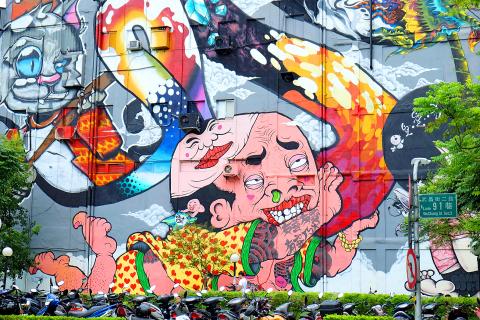Once vilified by the authorities and threatened with jail, Taiwan’s graffiti artists are now being encouraged to get out their spray cans to revive urban areas. Rundown districts around the nation have become legalized graffiti zones as Taiwan seeks to cast itself as a hub for creativity and design.
However, while some artists welcome the chance to show off their skills without repercussions, others say sticking to areas approved by authorities goes against the spirit of the anti-establishment art form.
In Taipei’s Ximending (西門町) shopping district, drab city walls have been brightened with large scale Technicolor graffiti.

Photo: Sam Yeh, AFP
A few blocks away from the area’s main neon-lit hub of chain stores and food vendors, a network of alleyways is home to smaller boutiques and a thriving street culture scene.
The walls of this area have become a legal canvas for graffiti artists, with images ranging from giant snakes to political caricatures.
Jimmy Cheng (鄭子靖), 39, a former graffiti artist, manages the zone. Artists come to him to show their portfolio before they are allowed to spray on the walls.

Photo: Sam Yeh, AFP
“We don’t have any rules, apart from no swear words and no pornography,” Cheng says.
“I think having these kind of areas is definitely a good idea,” he adds. “On a riverside wall you can spend a day painting, then the next day someone else covers it up. We tell our artists which parts they can paint on. Everybody follows the rules. Also we’ve introduced lots of events, like street dance and tattooing as well as graffiti.”
Cheng says before the derelict square was transformed, it was mainly used by the homeless.

Photo: Sam Yeh, AFP
Local graffiti artist Bio, 25, sees the area as an opportunity to make a mark on the city without the risk of arrest.
“Graffiti doesn’t always have to be a bad thing,” he says. “It makes a place shine... More and more people come here to take photos.”
The authorities’ new approach is a far cry from the previous zero-tolerance approach which saw one leading political artist, BBrother, prosecuted and given a three to five-year jail sentence in 2006 for illegal graffiti in Taipei.

Photo : Sam Yeh, AFP
The lawsuit was dropped after an online petition.
There is no law that specifically targets graffiti, but artists can be punished for damaging property, incurring up to a five-year jail sentence, although authorities say they rarely impose penalties.
“In the past, government agencies tended to ban and banish graffiti because of public sentiment,” an official from the Ministry of Culture. “But it has gradually become part of living spaces as people’s acceptance and knowledge of graffiti art has grown.”
Taipei has 10 legal graffiti zones while Taichung has seven areas.
Local officials in southern Taiwan are planning a similar district in Kaohsiung after the successful revitalization of a defunct railway repair station. The city’s Jiuru Street Art Factory became one of Taiwan’s first legalized graffiti areas in 2011 when the railway company gave permission for artists to take over the space.
For Amos, a 29-year-old graffiti artist in Taichung, Taiwan’s street art scene still has some way to go compared with what he sees in China, Japan, and in New York.
“There have been a lot of graffiti events in China in recent years, mostly government funded,” he says. “It can make a city feel younger, livelier.”
He also says that while legalized zones are useful, illegal graffiti will still flourish.
“Those who do graffiti tend to have a rebellious streak. They may go to the designated areas but they will still roam the streets,” he said. “Those who go to paint in the zones are artists who want to create a complete work or to learn and teach.”
Bio agrees that some will not be able to resist flouting the rules.
He has been arrested once for illegal graffiti and says his punishment was to clean it off as he could not afford the NT$200,000 fine.
It has not deterred him from exploring forbidden canvasses.
“I understand the government prefers us to do this [legal graffiti] and I respect that ... but there’s always a little devil in my heart. We don’t want to be restricted. That’s our spirit,” he said.
The government acknowledges the sanctioned parks will not stamp out illegal graffiti, but says it will continue with its policy to enhance the urban landscape.
“Some graffiti artists may think legalizing it will greatly diminish the thrill,” the ministry says. “But for the public, and the appearance of the city, it makes sense.”

Chinese Nationalist Party (KMT) Chairman Eric Chu (朱立倫), spokeswoman Yang Chih-yu (楊智伃) and Legislator Hsieh Lung-chieh (謝龍介) would be summoned by police for questioning for leading an illegal assembly on Thursday evening last week, Minister of the Interior Liu Shyh-fang (劉世芳) said today. The three KMT officials led an assembly outside the Taipei City Prosecutors’ Office, a restricted area where public assembly is not allowed, protesting the questioning of several KMT staff and searches of KMT headquarters and offices in a recall petition forgery case. Chu, Yang and Hsieh are all suspected of contravening the Assembly and Parade Act (集會遊行法) by holding

PRAISE: Japanese visitor Takashi Kubota said the Taiwanese temple architecture images showcased in the AI Art Gallery were the most impressive displays he saw Taiwan does not have an official pavilion at the World Expo in Osaka, Japan, because of its diplomatic predicament, but the government-backed Tech World pavilion is drawing interest with its unique recreations of works by Taiwanese artists. The pavilion features an artificial intelligence (AI)-based art gallery showcasing works of famous Taiwanese artists from the Japanese colonial period using innovative technologies. Among its main simulated displays are Eastern gouache paintings by Chen Chin (陳進), Lin Yu-shan (林玉山) and Kuo Hsueh-hu (郭雪湖), who were the three young Taiwanese painters selected for the East Asian Painting exhibition in 1927. Gouache is a water-based

Taiwan would welcome the return of Honduras as a diplomatic ally if its next president decides to make such a move, Minister of Foreign Affairs Lin Chia-lung (林佳龍) said yesterday. “Of course, we would welcome Honduras if they want to restore diplomatic ties with Taiwan after their elections,” Lin said at a meeting of the legislature’s Foreign Affairs and National Defense Committee, when asked to comment on statements made by two of the three Honduran presidential candidates during the presidential campaign in the Central American country. Taiwan is paying close attention to the region as a whole in the wake of a

OFF-TARGET: More than 30,000 participants were expected to take part in the Games next month, but only 6,550 foreign and 19,400 Taiwanese athletes have registered Taipei city councilors yesterday blasted the organizers of next month’s World Masters Games over sudden timetable and venue changes, which they said have caused thousands of participants to back out of the international sporting event, among other organizational issues. They also cited visa delays and political interference by China as reasons many foreign athletes are requesting refunds for the event, to be held from May 17 to 30. Jointly organized by the Taipei and New Taipei City governments, the games have been rocked by numerous controversies since preparations began in 2020. Taipei City Councilor Lin Yen-feng (林延鳳) said yesterday that new measures by